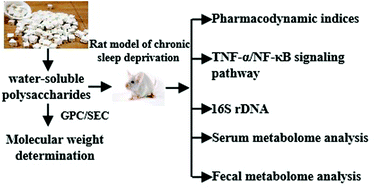Poria cocos water-soluble polysaccharide modulates anxiety-like behavior induced by sleep deprivation by regulating the gut dysbiosis, metabolic disorders and TNF-α/NF-κB signaling pathway†
Abstract
Poria cocos (P. cocos) has been traditionally used as folk medicine and functional food in China for more than 2000 years. The water-soluble polysaccharide is the main component of P. cocos decoction. The effects and mechanisms of the water-soluble polysaccharide from P. cocos (PCWP) were investigated in chronic sleep deprivation (CSD)-induced anxiety in rats. CSD induced anxiety, gut dysbiosis, and inflammatory responses, and reduced neurotransmitter levels, whereas PCWP intervention ameliorated anxiety-like behaviors, increased the levels of 5-hydroxytryptamine, dopamine, norepinephrine, and γ-aminobutyric acid in the hypothalamus, regulated gastrointestinal peptide levels, reduced inflammatory factors, and inhibited the tumor necrosis factor (TNF)-α/nuclear factor (NF)-κB signaling pathway in rats with CSD. The changes in the intestinal flora composition were determined using 16S rDNA sequencing, and indicated that PCWP significantly improved species richness and diversity in the intestinal flora of rats with anxiety, and adjusted the abundance of the following dysregulated bacteria closer to that of the normal group: Rikenellaceae_RC9_gut_group, Ruminococcus, Prevotellaceae_UCG-001, Prevotellaceae_NK3B31_group, Fusicatenibacter. Metabolomics was used to analyze fecal samples to identify significantly altered metabolites in the PCWP-treated groups. Thirty-eight PCWP-related metabolites and four metabolic pathways such as sphingolipid metabolism, taurine and hypotaurine metabolism, vitamin B6 metabolism, and glycerophospholipid metabolism were explored. The results of serum metabolomics showed that 26 biomarkers were significantly changed after PCWP intervention compared with the model group. The regulatory effects of metabolic pathway enrichment on sphingolipid, phenylalanine, and taurine and hypotaurine metabolism, and validation results showed that PCWP intervention regulated the activity of enzymes involved in the above metabolic pathways. A strong correlation between intestinal bacteria and potential biomarkers was found. Our findings present new evidence supporting the potential effect of PCWP in preventing the progression of anxiety by inhibiting the TNF-α/NF-κB signaling pathway, alleviating metabolic disorders, and ameliorating the gut microflora imbalance.



 Please wait while we load your content...
Please wait while we load your content...